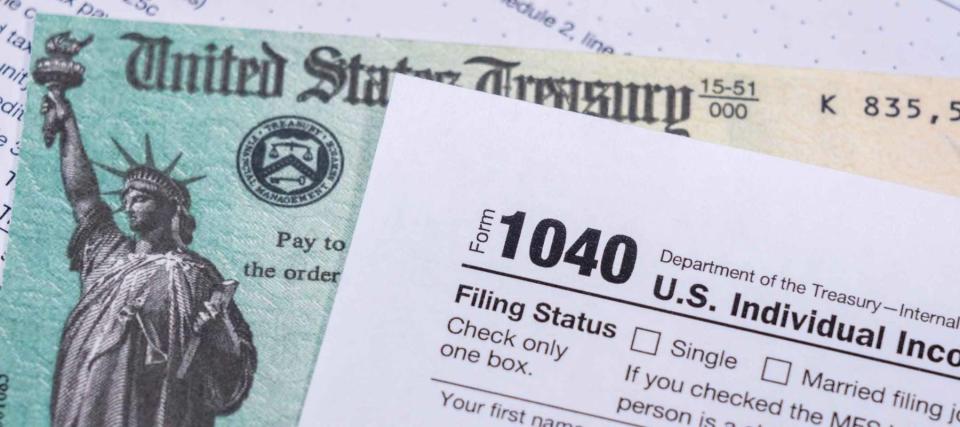How you can lose out on a $1,400 stimulus check by filing taxes right now

It often pays to file your taxes promptly (hello, early refund), but this year you may want to hold off — to benefit from the coming third round of COVID stimulus checks.
Moving quickly with your 2020 taxes might, in fact, keep you from receiving the full $1,400 in the new go-round — or prevent you from getting any stimulus check this time.
If you're counting on pocketing the maximum amount, so you can use the money to invest, build up your emergency savings or pay down debt, here’s why you may want to put your taxes on "pause."
You'll qualify for a stimulus check based on your income

The new stimulus checks are part of a $1.9 trillion pandemic relief bill that's expected to face a final vote in Congress this week. If all goes as planned, these third payments could start going out during the second half of March.
As with the first two rounds, the next checks have income limits. The $1,400 payments ($2,800 for couples) phase out; under the current bill, smaller amounts will go to:
Individuals with adjusted gross incomes (taxable income before deductions) between $75,000 and $80,000.
Married couples who file taxes jointly and have incomes between $150,000 and $160,000.
Head-of-household filers with incomes between $112,500 and $120,000.
You get no stimulus check if you're a:
Single filer making more than $80,000.
Couple earning over $160,000.
Head of household with an income above $120,000.
Did you make more money last year?
The IRS will look at your most recent tax return in its system — either for 2019 or 2020 — to determine how much money you can receive, if any.
Because of the coronavirus crisis, many Americans experienced a loss of income last year and might qualify for a larger stimulus check by getting their 2020 return to the tax agency before the new payments go out.
But as the stock market rallied last year, home prices hit record highs and essential businesses thrived, some people made more money than they did in 2019. If you're in that fortunate group, you might want to sit on your tax return for a bit.
Let's say you're a single tax filer, had adjusted gross income of $73,000 for 2019 but saw a jump to $90,000 in 2020. Your income from last year would disqualify you from a $1,400 stimulus check, but not your 2019 income.
So, you'd want to delay filing your 2020 return until after the IRS has sent you a direct payment.
The bill is moving quickly, so your return may not have a long wait

If you were hoping to get your return in quickly because you're likely to get a big tax refund, you probably won't have to postpone your filing for long.
The Democrats who control Congress expect to complete work on the COVID rescue legislation on Tuesday, then send it to President Joe Biden's desk for his signature.
For the last round of payments, the IRS started making direct deposits in late December — just two days after the legislation was signed. The timing for Round 3 is a little trickier, because the IRS is in the midst of tax season, but it helps that the tax agency has processed stimulus checks twice in the last year and knows the drill.
If you've got a refund coming, electronic filing using today's tax software can get your return into the IRS' system almost instantly after your economic stimulus money arrives.
What if neither return will get you a stimulus check?

If the income barriers for getting a stimulus check will keep you from receiving a payment based on either your 2019 or 2020 earnings, here are some ways to find $1,400 in your budget and essentially make your own stimulus check:
Cut the cost of your debt. If you’ve got a lot of credit card debt, you're probably paying a ton of interest. Tame that debt — and make it go away more quickly — by sweeping up your balances into a single, lower-interest debt consolidation loan.
Trade in your mortgage (if you've got one) and reduce your payments. Mortgage rates remain historically low, and refinancing your home loan could reward you with major savings. Experts say millions of homeowners who haven't yet refinanced can still cut hundreds of dollars off their monthly payments by taking out a fresh mortgage at a lower rate.
Make saving your policy. You don’t always have to pay a, well, premium on the best insurance policies. From auto insurance to homeowners insurance, shop around and make sure you’re not paying more than you should.
Stretch your dollars. Find the budge in your budget. Turn down the heat a little to save on electricity. Get rid of a couple of streaming services you never watch. Meal-plan for the week and cut back on expensive ingredients. And, download a free browser extension that will automatically find you deals and coupon codes every time you shop online.

 Yahoo Finance
Yahoo Finance 